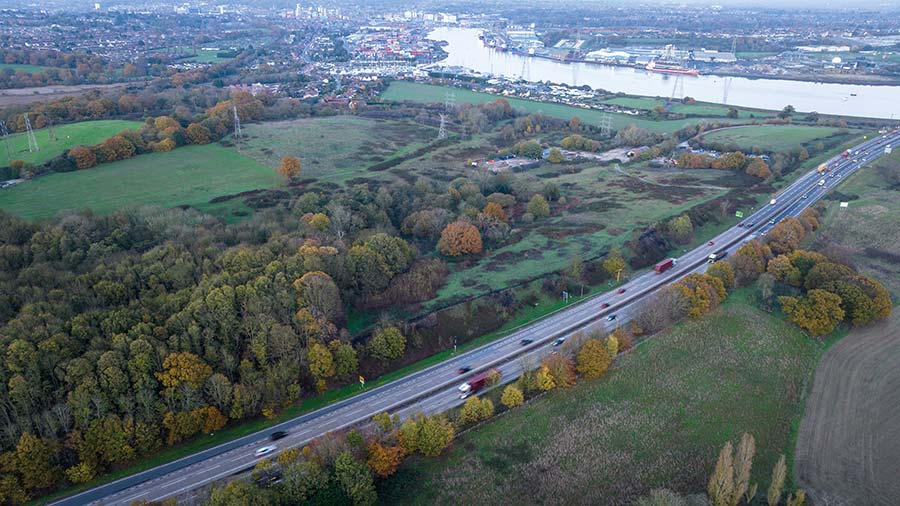Shortage of land to buy holds back selling decisions
 Farmland at Wherstead © BlueSky UAV
Farmland at Wherstead © BlueSky UAV Many decisions about marketing land and farms are on hold simply because those intending to sell cannot find anywhere to buy.
It is expected that 2023 will see more activity than last year, but for now there is a supply and demand Catch-22.
See also: Contract farming agreements – what to consider
The growing number of alternative land uses has complicated the market, making valuations and marketing decisions more difficult.
“The market has become wider and more nuanced,” said Richard Greasby, partner and head of rural at Butler Sherborn, which operates mainly in Gloucestershire and Oxfordshire.
“There are a number of properties that could be on the market tomorrow, but one of the problems is that the decision depends on people being able to find somewhere to move to,” he said.
Some are complicated by joint ownerships within families where conflicting aims and objectives can also hold back decisions to sell.
More buyers than ever
In Lincolnshire, DDM Agriculture has more buyers on its books than ever before, said managing director Giles Johnston.
However, some less usual properties are coming to the market.
In Suffolk, Brooks Leney is this week launching 43ha (107 acres) of land and woodland known as The Strand, Wherstead, which forms five of six lots on the outskirts of Ipswich, partly adjoining the River Orwell.
This is predominantly permanent pasture, with a large area of woodland and an element of marshland.
“The land has amenity value, as well as carbon capture and/or biodiversity net gain opportunities in a unique location,” said the firm’s Gwyn Church.
“Given its location and the nature of the land, we believe it will appeal to a variety of target markets such as amenity users, councils, developers, large corporate entities and so on.”
These five lots have individual guide prices totalling £765,000.
The remaining 5.4ha (13.3-acre) lot is more commercial in nature, having been used originally as a construction compound, and is being handled by Savills with a £1m guide price.

Foxhole Vineyard © Savills
Vineyard offerings
England’s growing vineyard sector is seeing more marketing activity. Two sites in Sussex and Lincolnshire offer entry at a lower capital level than many others.
The vines at Foxhole Vineyard, Bolney, West Sussex, were planted in 2008-2009 and are mainly Pinot Noir with smaller areas of Pinot Gris and Bacchus.
Foxhole has just come to the market with a guide price of £690,000.
Its 12ha (30 acres) are split roughly in equal shares between the deer-fenced vines and grass. Most of the land is gently undulating south-facing hillside, at 25m to 31m above sea level.
This is a sister vineyard to the Bolney Wine Estate and is being sold by the executors of Rodney Pratt, who established both vineyards and was a pioneer of the UK wine sector.
Chris Spofforth, head of Savills’ viticulture team, said: “As Foxhole is purely a producer of grapes, it would suit an existing producer who needs a reliable source of fruit or a new entrant looking to create their own personal brand without having to start from scratch.’’
In Lincolnshire, Somerby Vineyard near Barnetby is on the market due to retirement. It has produced award-winning wines including a gold at the English and Welsh wine of the year awards in 2014.
Most of the 9,000 vines were planted 12 to 14 years ago, which leaves them with a further 50-plus productive years, said Savills.
The varieties here are Pinot Noir, Solaris and Rondo, with scope to plant 3,000 more vines.
On just over 5ha (12.5 acres), the land is Grade 3, with Upton 1 series soils which are shallow, well drained calcareous silty over chalk.
The land is southerly facing and sloped, from 20m to 35m above sea level. Access is through three rights of way over third-party land and a further 1ha (2.5 acres) planted with about 1,500 Pinot Noir vines is available to rent.
Somerby has its own winery in two modern steel portal framed buildings with capacity for 20,000 litres with bottling and labelling facilities and the potential to expand to 150,000 litres.
The site offers large scope for expansion through the growing viticulture tourism sector.
Henry King, farm agent at Savills in Lincoln, has set a guide price of £700,000 for Somerby.
